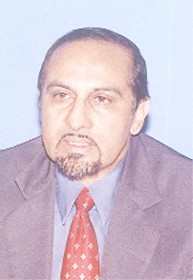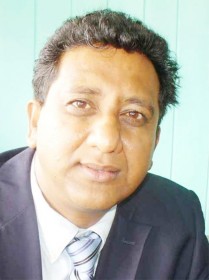A controversy over whether a magistrate can determine the admissibility of a confession statement recently erupted in the wake of the dismissal of the case against murder accused David Leander, with former Chief Magistrate KA Juman-Yassin and PPP/C MP Anil Nandlall weighing in on what the legal procedure is. Former Attorney General Bernard De Santos is now on record as endorsing Yassin’s legal opinion.

“You can quote me as saying that Mr Yassin correctly stated what the current position is,” De Santos said in an invited comment on Friday.
The debate stemmed from a public criticism by the ruling party of the decision by Magistrate Yohhahnseh Cave to throw out Leander’s confession statement during the Preliminary Inquiry. The court was not fully satisfied that the oral statement allegedly made by Leander was taken under circumstances that were “free and voluntary.”
The People’s Progressive Party (PPP) argued in a press statement that it had been advised by legal experts that “the issue of admissibility of evidence is to be determined at the trial and not at the preliminary inquiry.” At a committal proceeding, the PPP said, a confession of the accused will be tendered into evidence “since its actual admissibility on the basis of voluntariness can only be determined at a voir dire hearing in the trial at the High Court.”

But in a letter to this newspaper which appeared last Sunday, Juman-Yassin rejected the PPP claims of what constitutes the legal procedure here and referred to its declaration that confession statements are accepted in evidence at preliminary inquires and that only at a voir dire in the High Court is the matter of voluntariness determined as “completely erroneous.”
He argued that the preliminary inquiry is in reality a trial and all the rules of evidence apply, noting that no hearsay evidence should be admitted in evidence and “any exhibit which is sought to be tendered must satisfy the rules of admissibility.”
According to Juman-Yassin, the accused or his legal representative has the right to object to any evidence which the prosecution seeks to tender.
“If there is an objection to a confession statement, then the magistrate who is conducting the hearing will commence a voir dire. This is a trial within a trial and after the prosecution has led evidence to show that it was free and voluntary, the defence can make submissions that the prosecution has not discharged the onus of proof. Upon the magistrate finding that a case has been made out, then the accused can give evidence and call witnesses in this voir dire,” Juman-Yassin stated.
Former President of the Guyana Bar Association (GBA), Nigel Hughes supported Juman-Yassin’s arguments saying that Magistrate Cave was “within his right” to conduct the hearing to determine admissibility. He argued that if an alleged confession statement is the only evidence in the PI supporting the prosecution’s case then a voir dire is to be held on the objection of the accused.
Hughes said in an invited comment that “it would be futile to hold the hearing to determine admissibility” if the prosecution has other evidence to establish a prima facie case. Any objection in such an instance would be recorded, Hughes said, but the voir dire is held in the High Court.
Additionally, Hughes registered his disappointment with the GBA saying that he had expected the body to issue a statement in support of bench in the face of a “stringent criticism by a political party of a Magistrate who was executing his duties” within the ambit of the laws.
In his letter, the former Chief Magistrate contended that after all the evidence for the prosecution and if any for the defence has been led, the prosecutor and counsel for the accused or the accused himself can address the court in order to put forward their respective case.
According to counsel, it is only then the magistrate can rule whether to admit the confession in evidence or reject same.
Juman-Yassin stated that if the prosecution should want to tender in evidence a confession statement which is either oral or in writing, they have to satisfy the court that the statement was free and voluntary. He contended that they must lead positive evidence that no force, threats, inducement, coercion and or such act that may sap the free will of the accused was used and or utilized in the obtaining of the confession.
But in a letter to Stabroek News published on Tuesday last, PPP/C Member of Parliament Anil Nandlall challenged Juman-Yassin’s opinion and argued that legal authorities support the PPP contention that the admissibility of confession statements should be decided by a voir dire in the High Court and not by a magistrate in a preliminary inquiry.
Nandlall cited several authorities which he said governs the practice here and establishes the procedures as it relates to the issue.
He referred to Blackstone’s Criminal Practice (1996) at page 1098 which cites [with approval] the legal opinion of LJ May in Oxford City Justices, ex parte Berry (1988) QB 50 at page 51 as “an accurate declaration of the law, practice and procedure in respect of the issue under review”.
“His Lordship [LJ May] stated thus: “…the question of the voluntariness or otherwise of alleged confessions by an accused has hitherto seldom, if ever, been investigated in committal proceedings before Justices, [magistrates] save perhaps to have some matters of fact established in the cross-examination of prosecution witnesses to found a subsequent challenge to a confession at the ultimate trial on indictment,”’ Nandlall said.
In the region, he said that the pre-eminent authority in this area of the law is Commonwealth Caribbean Criminal Practice and Procedure, Second Edition, (2006), by Dana S Seetahal, SC, of the Trinidad and Tobago Bar.
“… at 171 of this text, the author deals with the issue of admissibility of evidence at a preliminary inquiry. After reciting the English practice to which I have alluded above, the author adumbrates the position in the Caribbean to be similar and as follows: “In the Commonwealth Caribbean, examining magistrates act in accordance with this practice [the English practice] on the basis that disputed admissibility questions are for the trial court,”’ the attorney continued.
Nandlall said further that the PPP’s statement is neither as “unjustified” nor “without basis” as Yassin argued. He said too that he is aware of a circular emanating from the Chambers of the Director of Public Prosecutions propounding certain procedural guidelines for magistrates in respect of, inter alia, the admissibility of confession statements at a preliminary inquiry. “Those guidelines are crafted in line with the aforementioned authorities,” he maintained.
“At committal proceedings, therefore, a confession of the defendant will be tendered into evidence since its actual admissibility on the basis of voluntariness can only be determined on a voire dire hearing at trial. Until then it constitutes legal evidence,” Nandlall added.
In handing down judgment Magistrate Cave justified his decision to hold the voir dire, saying that the court saw it fit to conduct the hearing into the admissibility of the alleged statement based on the arguments made by both the prosecution and defence.
The court, Magistrate Cave said , must express its opinion that the evidence led by the prosecution, presumably in an attempt to satisfy the court on the issue of Leander’s voluntariness when the purported oral statement was allegedly made, “does not match the gravity of the troubling allegations” made by the defence of the violence meted out to the accused.
“In light of all these circumstances this court felt compelled to hold a voir dire to inquire into the admissibility of the purported statement. At the end of the voir dire the Prosecutor Mr S Datadin submitted that the court ought to admit the statement since it was inappropriate to canvass the issue of voluntariness at the stage of committal proceedings and that the proper course was to admit the statement and to leave the issue to be canvassed before the trial judge,” the Magistrate stated.
But the Magistrate said also that should the court adopt the view proffered by the prosecution then the court’s ruling may as well be rendered ineffective. Datadin’s objection, he said, “sought to impugn the entire circumstances on which the accused was kept in custody.”
Magistrate Yohannseh Cave had ruled on the oral statement on July 17, a few days before murder accused David Leander called `Biscuit’ died under questionable circumstances. Leander of Vigilance, East Coast Demerara (ECD) was charged on November 8, 2007 with the murders of Sawh, his brother Rajpat Sawh, his sister Phulmattie Persaud and his security guard Curtis Robinson on April 22 at La Bonne Intention (LBI), ECD.









